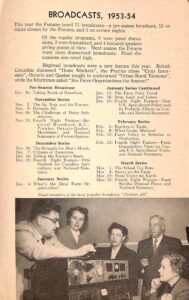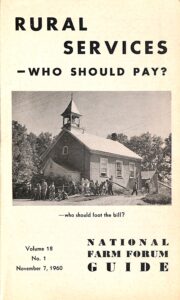(Written by Andrew Sandock)
 The Ontario Historical Education Collection (OHEC) at OISE Library houses eight special collections from private donors featuring materials related to fascinating moments in the history of Ontario education. One of these collections is the Canadian Farm Radio Forum collection, which contains dozens of administrative records, publicity items, photographs, and even scrapbooks pertaining to the development and implementation of the Farm Radio Forum program from 1941-1964.
The Ontario Historical Education Collection (OHEC) at OISE Library houses eight special collections from private donors featuring materials related to fascinating moments in the history of Ontario education. One of these collections is the Canadian Farm Radio Forum collection, which contains dozens of administrative records, publicity items, photographs, and even scrapbooks pertaining to the development and implementation of the Farm Radio Forum program from 1941-1964.
In 1935, the Canadian Association for Adult Education (CAAE) was founded with E.A. Corbett at its head. Corbett was a staunch nationalist who focused his efforts on citizenship education and rural education in a country which was rapidly urbanizing in the post-Depression era. The growing concern surrounding the lack of resources directed towards rural Canadians led to the initiation of the Canadian Farm Radio Forum — a mechanism for encouraging adult literacy and community engagement in local issues which harnessed the power and reach of public radio to reach audiences far and wide across disparate Canadian regions.
The CAAE recruited the help of the Canadian Federation of Agriculture and CBC Radio to launch the program in 1941. Small Radio Forum “groups” were formed around localities; from November to March, neighbours would meet at a local residence weekly to tune in to the program which addressed agricultural needs and themes related to civic engagement. Groups would facilitate discussion amongst themselves to determine the greatest needs of their own communities, and would organize projects to promote community development. These projects ranged from organizing school bus routes through rural areas, to organizing vaccine drives for livestock. Groups would liaise and coordinate each other through national channels. At its peak in 1949, the Canadian Farm Radio Forum boasted over 1500 chapters wither over 21,000 members across the nation.
Despite its suspension in 1965, the Canadian Farm Radio forum remains a stellar example of civic education by innovative means. Inspired by the Canadian initiative, UNESCO took the idea global, implementing similar projects in France, Ghana, and India. Today, Farm Radio International continues to implement similar programming throughout the world.
This collection is a key to the study of adult education in Canada, serving as a reference point from which similar initiatives stemmed and grew in the decades since the founding of the CAAE. Crucially, it is a testament to the success of government institutions working in tandem with grassroots community organizations to help underserved populations prosper. It is also a compelling look into the world of education initiatives in the media, and the critical role multimedia technologies like radio and television can play in educational and community organizing processes. As technologies and their roles in society develop and change, it is worth thinking about the traces and trajectories of media and education, and the propensity for new public education programs through innovative means in the future. Perhaps the Canadian Farm Radio Forum can serve as a model for the expansion of education initiatives through public media.
education initiatives in the media, and the critical role multimedia technologies like radio and television can play in educational and community organizing processes. As technologies and their roles in society develop and change, it is worth thinking about the traces and trajectories of media and education, and the propensity for new public education programs through innovative means in the future. Perhaps the Canadian Farm Radio Forum can serve as a model for the expansion of education initiatives through public media.
OHEC archival materials are available and accessible for anyone to view. Book an appointment at the OHEC to explore the Canadian Farm Radio Forum collection and the other incredible special collections in our care.
